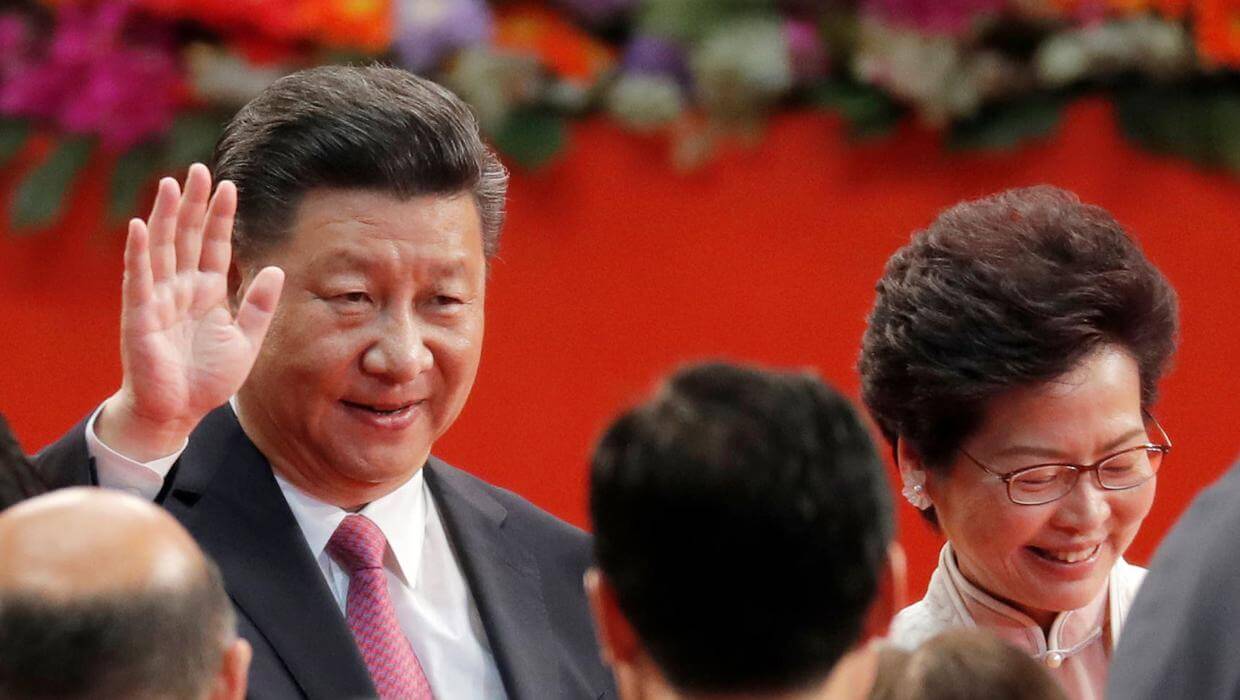In his speech marking the 25th anniversary of Hong Kong’s handover to mainland China on Friday, Chinese President Xi Jinping hailed the “One Country, Two Systems” policy that increased Beijing’s control over the special administrative region (SAR).
Xi expressed his “heartfelt appreciation” to “compatriots both at home and abroad… for their support for the cause of “one country, two systems” and for Hong Kong’s prosperity and stability.” Xi also claimed that “the success” of the governing policy had “won recognition throughout the world” over the past 25 years, because of the joint efforts of China, the Hong Kong government, and the city’s citizens. Hong Kong’s handover to China “marked the beginning of a new era for the region,” he said.
Hong Kong's 'true democracy' started after handover- Xi Jinping: Chinese leader Xi Jinping said on Friday Hong Kong's "true democracy" started after the city's handover to China from colonial Britain 25 years ago. "After reuniting with the motherland, Hong Kong's people became pic.twitter.com/ZXyYIRYYcL
— World News 24 (@DailyWorld24) July 1, 2022
The Chinese President added that by “proactively integrating itself” into China’s “overall development and carving out its role in national strategies, Hong Kong has maintained its strengths in its high degree of openness and in aligning with international rules.” He underscored that the region “has been playing an important role in raising China’s opening up to a higher level with wider coverage and scope.”
Xi further highlighted the benefits of the policy to Kong Kong itself, highlighting the “continuously expanding areas and enabling mechanisms for Hong Kong’s cooperation and exchanges with the mainland,” because of which, Hong Kong residents now have “better opportunities to start their own businesses and make achievements.”
When the British handed it to Beijing in 1997, Hong Kong was promised 50 years of self-government and freedoms of assembly, speech and press that are not allowed on the Chinese mainland.
— The Associated Press (@AP) July 1, 2022
But as the city marks 25 years under Beijing’s rule, those promises are wearing thin. pic.twitter.com/oTqLpK71F2
In a vague recognition of the city’s pro-democracy protests against Beijing’s crackdown on its political freedom two years ago, Xi said that the city had “overcome various hardships and challenges and advanced steadily forward.” “Be it the global financial crisis, the COVID-19 epidemic, or social unrest, none of them have stopped Hong Kong from marching forward,” Xi said.
Beijing’s efforts to quash dissent in the SAR have gained swift momentum over the past three years. In June 2020, the Standing Committee of the National People’s Congress (NPC) unanimously approved the national security law (NSL), bypassing Hong Kong’s own legislature. The draconian law’s open-ended and ambiguous language punishes activities of secession, subversion, terrorism, and collusion with foreign or external forces. The law can be applied to the simplest acts of resistance.
This year marks the 25th anniversary of #HongKong's return to China. The ceremony in 1997 — exactly 25 years ago today — is heart-stirring to watch after 25 years! #HKSAR25 pic.twitter.com/TjwWEMIkSa
— Qin Gang 秦刚 (@AmbQinGang) June 30, 2022
Almost immediately after the passage of the NSL, hundreds of protestors, including leaders such as Jimmy Lai and Joshua Wong, were arrested; those caught fleeing to Taiwan were jailed as well. Next, Hong Kong’s Education Bureau called on schools to review and revise textbooks in order to “stress Chinese identity” and make sure they do not violate the law.
Furthermore, last July, a dozen pro-democracy candidates were disqualified from running in the September election for “colluding with foreign forces”. Likewise, in November, four opposition members were expelled from the Hong Kong legislature shortly after Beijing passed a resolution allowing local authorities to expel legislators who were deemed a threat to national security without having to go through the courts. The remaining 15 opposition members of the 70-seat Legislative Council subsequently resigned en masse in a show of protest, tightening Beijing’s ontrol. Furthermore, the Basic Law was amended to ensure that only “patriots” vetted by Beijing could contest elections.
In a nod to the rapid transformation of Hong Kong’s governance due to Beijing’s crackdown, Xi said that “With a high degree of autonomy in practice, the region has truly entered an era of democracy.” Xi claimed that the adoption of the NSL has “established the legal system to safeguard national security in the region” and asserted that the electoral system has been “modified and improved.”
No matter how hard the China-haters in the West try to besmirch Hong Kong, the SAR, given its remarkable achievements over the past 25 years under the "one country, two systems" framework, will not fall into their trap. pic.twitter.com/agN6kdF5jS
— Zhang Meifang张美芳 (@CGMeifangZhang) July 3, 2022
Reiterating the pre-requisites for the success and sustenance of the policy, Xi unveiled a four-point roadmap. “First, we must fully and faithfully implement the principle of “one country, two systems”...Second, we must uphold the central government’s overall jurisdiction while securing the SARs’ high degree of autonomy…Third, we must ensure that Hong Kong is administered by patriots… Fourth, we must maintain Hong Kong's distinctive status and advantages,” he remarked.
“Its fundamental purpose is to safeguard China’s sovereignty, security, and development interests and to maintain long-term prosperity and stability in Hong Kong and Macao,” Xi said in defence of Beijing’s policies.

